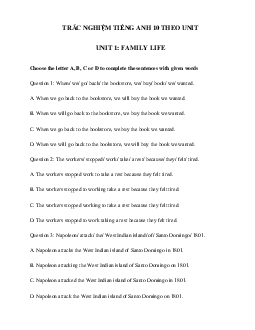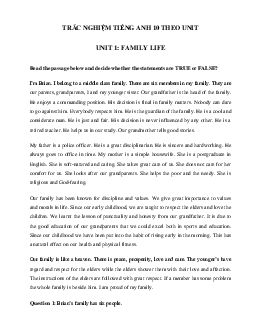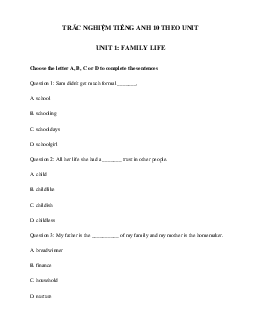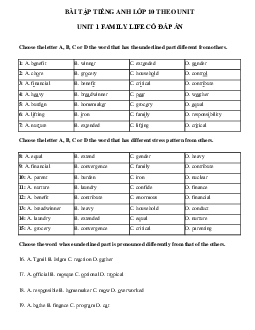

Preview text:
TIẾNG ANH LỚP 10 GLOBAL SUCCESS
UNIT 1 - SPEAKING TRANG 12
1. Below are reasons why children should or shouldn’t do housework. Put them in the
correct column. Add some more if you can. Dưới đây là những lý do tại sao trẻ em nên hoặc
không nên làm việc nhà. Đặt các lí do vào đúng cột. Thêm một số lí do nếu bạn có thể. Đáp án - Should
Doing housework teaches them to take responsibilities.
Doing housework helps strengthen family bond. - Shouldn't
Kids should be given plenty of playtime when they are young.
They may break or damage things when doing housework.
They need more time to study and do homework.
2. Work in pairs. Complete the conversation between Anna, Nam, and Minh using some
ideas from 1. Then listen to the conversation and check your answer. Làm việc theo cặp.
Hoàn thành đoạn hội thoại giữa Anna, Nam và Minh bằng một số ý từ bài 1. Sau đó, nghe đoạn
hội thoại và kiểm tra câu trả lời của bạn. Đáp án
1 - doing housework helps them develop life skills
2 - They may break or damage things when doing housework. Nội dung bài nghe
Anna: Nam, why do you think children should do housework?
Nam: Because doing housework helps them develop life skills.
Anna: It’s true. Life skills such as cooking, cleaning or taking care of others are really necessary for kids when they grow up.
Nam: Yes, we should all have these basic life skills to be adults.
Anna: Now Minh, why do you think children shouldn’t do housework?
Minh: I think kids are kids. They should be given plenty of playtime when they are young.
Nam: I don’t agree with you. I’m afraid too much playtime isn’t good for children.
Anna: Well, thank you both for sharing your ideas. They are very useful for my project.
3. Work in groups. Have similar conversations exchanging opinions about whether
children should or shouldn’t do housework. You can use the ideas from 1 and the reading
text. Làm việc nhóm. Thực hiện những cuộc trò chuyện tương tự để trao đổi ý kiến về việc trẻ
nên hay không nên làm việc nhà. Bạn có thể sử dụng các ý tưởng từ bài 1 và bài đọc ở trên.




